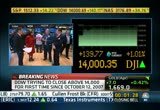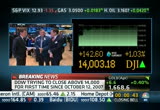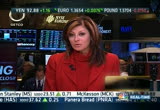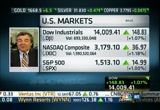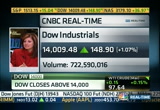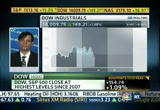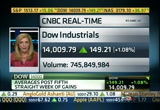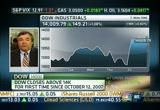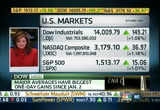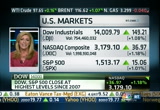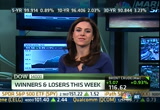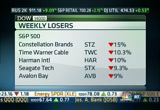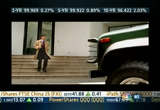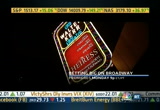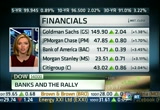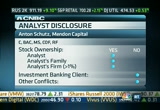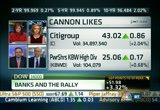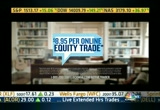tv Closing Bell With Maria Bartiromo CNBC February 1, 2013 4:00pm-5:00pm EST
4:00 pm
anything from apple. apple's already left, then what? >> i would turn it around the other way and say look how well we've acted with apple being under the gun and that's remarkable finally showing money that's come out of there is going to the wider market as a hole and that's a positive sign. >> i'll head back. great week, scott. great working with you. i want to know what the largest manager of assets in mixed income has to say about that. we'll talk to bill gross in the next hour. have a great weekend, guys. thank you so much. >> thanks so much. >> does it mean anything to you, warren, if we go into the weekend and we're unable to hold 14,000? >> not in the least. a psychological number, nothing more than that. no meaning to me. >> nor to me. the market -- the valuation is very key longer term and the valuations are not excessive right here. they are a little bit above expensive, but they are not excessive right here. >> are you worried, david, that the fed gets out of the way too soon? and the market can't sustain itself without that?
4:01 pm
>> scott, it's a great point. you've got the monetary stimulus, zero interest rates for 49 months. the 10th of february will be 15 months. the fed getting out of the way is a sign of strength and recuperation, recovery, renaissance and rebound. all rs. >> the last word, warren. >> i certainly believe the data we've been getting, the economic data has been just good enough to allow the fed to keep rates low and still see signs of improvement. that's a great, great combination for the equity market. >> thanks so much. enjoy the weekend. markets settling out. looks like we'll get the first close above 14,000 since 2007. and the rally rolls on. the bull rally showing no signs of slowdown. 4:00 on wall street. do you know where your money is? hi, everybody, welcome back to the "closing bell." i'm maria bartiromo on the floor of the new york stock exchange on an exciting friday. the dow looks like it will settle above 14,000 for the first time in 2007. we've got a printer right here,
4:02 pm
14,008. things are settling out. we'll keep checking back and see if this sticks, a gain of the session of 150 points, better than 1% on the dow. nasdaq composite picks up 37 points, better than 1% there as well and the standard & poor's index up 15%, 1% there as well. the dow above 14,000 for the first time since 2007. had a does that mean? we kick off this special coverage right now. harry dent with s with me of h.s. dent investment management and scott rand and lee munson from portfolio asset management and stephanie link, cnbc contributor from the street. good to see everybody. thanks so much for joining us. >> thanks, maria. >> scott, let me kick it off with you. what's behind this move in stocks? >> this year is off to a lot better start. i don't know if you heard the applause in the background when the bell rang. people are happy. we're at 14,000, a touch over. i think the market, myself not to put a damper on things, i think the market is a little ahead of itself. i think it's going to be higher than this at year end, but right
4:03 pm
now this is a pretty darn good jump from december 3 isst until now. the question is does it keep going. harry dent, where are you on this? >> we've been looking for the market to go higher until mid-year. i'm looking at 1,600 or near on the s&p, 15,000 or near on the dow. i think before you get there though you do get a more substantial pullback before you get a likely top. i mean, right now, things are good. we got over the fiscal cliff. we knew we would rally after that. i don't see this rally going to major heights this year or a lot higher because earnings are decelerating, and now interest rates are rising. long-term rates are rising despite qe3 being so strong. we're getting near the end of this, but i do think there's a good bit to go. >> in other words, ride it up until -- what is going to be the catalyst that actually sends this market lower? we know there's no great shakes to talk about with the economy. sure, we have a better situation in housing and corporate cash is
4:04 pm
strong. still got real pockets and real issues and uncertainties. >> no, no, there are. >> what's the catalyst? >> robert schiller was saying even the housing rally doesn't look at strong to him as people think. he's serving customers rather than speculators saying people aren't really that much more bullish on housing so even the housing thing may not have the legs that people think. >> but, you know, harry, own if the housing doesn't have the thing, it's still improving. we've still got jobless rates going down and quite frankly i think qe3 is working, and as long as we don't have job raise go below 6.5 the pump will pump up this thing like an old athlete on steroid. >> basis points are up despite qe3. that's not working. >> those are long rates only and that's because there's less risk aversion out there. people want more risky assets. this doesn't make the commercial banking system heal and get the money velocity working.
4:05 pm
>> stephanie link, what do you think? 14,009 and change with a gain of 1%. how do you think next week plays out? >> well, it's interesting. so many people are looking for a correction. so many people are trying to pick at the negatives, and i'm not sure you're going to get this major correction that everybody is looking for because quite honestly -- >> that's part of the problem. >> wait a second. the point of it is that the reason is because the data is actually getting better. look at all of the u.s. data this week, durable goods, pending home sales, case schiller, core logic, ism, across the bond, even the gdp and non-farm payroll numbers today, a lot of interesting data points under the surface that are actually showing things are getting better. maria, you said before to herb, don't fight the fed. it's working, clearly. now you also have china doing a little bit better, 50 on the pmi overnight. europe had the best pmi in nine month. not everything is per forgets
4:06 pm
and i certainly think we'll see a volatility, but everybody is talking about a correction, and i think at the end of the day the facts are things are getting better. oh, by the way, earnings are running at about 5%. that's different from the third quarter when we saw negative 5%. i would say earnings are not decelerating, actually in the bottoming process and headed higher. >> what about that, scott? you said it is decelerating. >> earnings are only going to be up about 5% this yore. we're at that point of the psych. i think that all the things that stephanie mentioned are true, but all that means to me is that the economy is moving ahead at 2%, 2.5% growth rate. that's nothing to write home about. you know, valuations aren't going to be pushed up higher on a pe basis when you've got, you know, you're expected 2%, 2.5% growth. nobody is going to run up these bes big time this year, i don't think. i hope harry is right. would love to see a correction. i think it's an opportunity. i don't know what the catalyst is. i hope it's government negotiations over the sequestration. give me a 5%, 10% correction,
4:07 pm
i'd love it. we'd be pounding the table to buy stocks. >> i'm out here in san diego at the t.d. ameritrade conference, 1,000 or so big-yield advisers who handle billions of dollars for wealthy americans all over. first of all, they are all 55 and up, all baby boomers and all mad that, you know, when see a 6 gdp and now it's 2 or 3, they are thinking it's negative 2 or 3, not like oat 80s, not like the '90s. they are frustrating and want in and want the correction to happen. i ask my buddies who are bears, what's going to happen? i don't see a catalyst, so the problem is i don't think we're going to get something that will bring it all down so everybody can dump their useless managed future funds that they have been in so that they can go back and buy stock. they are frustrated and want it. the market goes higher because of it. >> what do you want to be exposed to then? let's say this continues higher, lee. i mean, where do you want to be exposed? is the leadership that took us here going to be the leadership that takes us even partner.
4:08 pm
>> most like will you, but i think you have to stick in the united states right now. i still think europe, some people think it's going to be 12 months. i think it might be 24 months. i'm not that bullish. i still think if you stick in the united states, be broad bads, man, just buy the s&p 500, make it easy on yourself because uncle ben is making it easy for everybody, and if you want to be in tech, be in tech and commodities, the only thing i like is copper. outside of that, even our emerging market position, overweight, thinking about paring that down in the next couple of would ex? what about corporate bonds in. >> if you listen to a lot of conference calls, some of the interest rates that you think would be lagging like the industrials, because they are exposed to the global economy, they are actually doing quite well, so i think that that group is one that you want to be involved in. i think that financials are certainly an area where you want and could be leaders given the housing boom and given that they are starting to lend again. 5% on average loan growth in the quarter from this industry so i like this group, too.
4:09 pm
>> next week, what are the cat lifts that we need to be aware of in terms of taking this market even further up? >> next week actually we get a slew of earnings. 17% of the s&p 500. they are going to be reporting next week, so you get companies like yum brands. going to get a good read on china and just international markets, but eaton and emerson, those companies, disney, news corp., more of a global read i think next week. that will be important. >> all right. we'll leave it there. thanks, everybody. appreciate your time tonight. we'll keep watching this market. teflon market really. see you soon. have a great weekend. the dow makes history, the industrial average closing above 14,000 for the first time since october of 2007 looking in a five-week winning streak to boot. jackie d'angelis with the week's winners and losers. over to you, jackie. >> hey, good afternoon, maria. what a week for stocks. let's take a look at the ones that led the stocks higher starting with valero with a big earnings beat and hess told analysts that the company is
4:10 pm
looking carefully at a proposal to break the company up, and pitney-bowes, fourth-quarter earnings might have fallen 56%, but adjusted earnings per share beat expects and jdsu bringing up the year as they posted stronger margins and revenue. best performer on the dow this week, verizon communications, but along with the winners there were also big losers. real estate investment trust of a von bay had a tough fourth quarter, incomes slumping 62% and seagate technology reporting second-quarter profits down 16% and harmon international a 20% drop in profits and the company cutting at least 500 jobs as part of restructuring. twc losing ground at its fourth-quarter profits fell 9% and constellation brands trying to block the anheuser-busch takeover of modelo. worst performer on the dow this
4:11 pm
week, merck after reporting that profits declined. maria, back for you. >> yeah, not participating in the rally, for sure. thanks. much more ahead on this edition of the "closing bell." what's up with pimco's bill gross who will speak with me after the break. he refuses to buy into the bull market. and bob dahl stuck his neck out on the bullish market. right now he looks very correct. he's coming up to give us the backdrop on that and the banks, held their feet to the fire during the financial crisis. find out how wall street's paychecks are keeping pace with the surge in the markets. back in a moment. all stations come over to mission a for a final go.
4:12 pm
this is for real this time. step seven point two one two. verify and lock. command is locked. five seconds. three, two, one. standing by for capture. the most innovative software on the planet... dragon is captured. is connecting today's leading companies to places beyond it. siemens. answers. [ male announcer ] with citibank it's easy for jay
4:13 pm
to deposit checks from anywhere. [ wind howling ] easier than actually going to the bank. mobile check deposit. easier banking. standard at citibank. mobile check deposit. easier banking. for ovnights can feel califolong and lonely.dren, i miss my sister. i miss my old school. i miss my room. i don't want special treatment. i just wanna feel normal. to help, sleep train is collecting pajamas for foster children, big and small. bring your gift to any sleep train, and help make a foster child's night a little cozier. not everyone can be a foster parent, but anyone can help a foster child. makes it easy for anne to manage her finances when she's on the go. even when she's not going anywhere. citibank for ipad. easier banking.
4:14 pm
standard at citibank. welcome back. the real question facing investors is whether we're entering a new long-term bull market. bob pisani takes a look at a move needed for a multi-year move. >> are wenting a bull market like the one from 2009 to 12 when the s&p rose more than 100%? stocks have been doing well because the fed is keeping rates at zero. no where else to put money. companies are doing cost-cutting initiatives and the pe ratio is not exorbitant. that's not enough. we'll take a lot more to get us to new highs to. do that, to make an argument that we should continue to move
4:15 pm
forward and do other things and rally for several more years, we'd need to see much more robust gdp growth and more revenue growth which has become anemic. what would get us to gdp growth and revenue growth? one, clarification from washington, a grand bergan encompassing deficit reduction with tax reform, entime reform and deschristianry spending reforms in areas like debt. extension of the debt ceiling for two years. clarification on europe. first, the recession needs to stabilize, but beyond that, policy initiatives clearly indicate a road to political and fiscal and banking reforms and an indication that europe is serious about improving competitiveness. resumption of growth in emerging economies, like china, and finally the federal successfully engineering a modest increase in interest rates without unleashing runaway inflation. maria, these are tall orders, i know, but resolution of all these issues would be a huge boost to business confidence, capital expenditures and hiring
4:16 pm
would increase dramatically and revenues would rise, and that's what we need, maria. back to you. >> that's some list, bob. >> pretty ambitious. >> we'll be watching that. not everybody is buying into this bull market theory, by the way. pimco's bill gross is actually warning investors to be afraid, and i mean very afraid, of how inflation and the flood of cheap money will impact investments from here on out. bill joins me exclusively from pimco headquarters in california. good to see you. >> thank you, maria. >> thaepgs for joining us. if not the stock market, what are you betting on? >> we are betting on the stock market. we just think it's a baby bull, maria, as opposed to a magnificent bull in spain where they award two ears and a tail for the big fight. we think this is the return of 4% to 6% as opposed to double digits which is what we've experienced in the past. we like stocks. bob pisani has it right in terms of his agenda, if fulfilled, but the fact is that credit, you know, at some point runs into a dead end in terms of its ability
4:17 pm
to engender a real froet and profits, and so we're basically at that point in our view. we've expanded credit from 3 trillion to 56 trillion, you know, since the early 1970s and the ability of credit to generate more growth and wealth is reaching limits. >> right. let me ask you this. i mean, let's talk about the downside risks of all the cheap money. we know why this market is rallying as much as it is. there are very few al terrence to some of the indications of a better economy here. what's the downside risk of the federal reserve? >> the downside risk is that there are negative as totes zero-based money to low interest rates. ultimately, you know, take the example of banks. their net interest rate margins, their ability to earn a profit at a spread, is reduced simply
4:18 pm
because yields have come down so low and they can't borrow at anything less than 25 basis points. same thing with insurance companies in terms of their leverage and their ability to generate profits on money. same thing in terms of pension funds. they are in a big hole these days simply because they have underestimated their liabilities going forward, so all of these financial institutions, you know, engender negative aspects to the real economy as they download, as they downside, as they lay off people. that there are negative aspects to very cheap money, and i think ben bernanke has recognized that over the few few years. >> reporter: interesting to see the condition of the markets. the gdp report, how would you characterize it and what stops this momentum given that the become don is just okay. >> real growth has been about 1.5%, our new northal type of
4:19 pm
economy, maria, simply because of some of the forces that we've described, the weakness engendered by zero-based money. going forward, what's going to stop the momentum? you know, i think rotations from bonds to stocks, which is the big agenda at the moment, you know, basically work with the three to six-month lag. it takes that long for quarterly statements and momentum to change attitudes and allocations among investors, and, you know, since november 15th, stocks have begun to outperform bonds and now by about 10%, and that should lead at some point to additional reallocations, but i will say that pimco, which, as you know, is primarily a bond firm, has had a great january. we've had 20 billion in inflows so we expect much of the rotation has come from cash and money market funds instead of bonds. >> that's what i want to ask you. where is this money coming from? we don't necessarily believe fully that in fact there's a
4:20 pm
rotation going on out of bonds into stocks. you think the money is coming from cash? >> we do. you know, there were capital gains taken prematurely in order to beat the tax hike or extra special dividends given in november and december with much the same attitude in mind, and so the cash that has been resting with investor balance sheets is now coming into the stock market basically by passing bonds but not using bonds as an allocation vehicle. ultimately the potential rotation from bonds to stocks will be tempered by dem graphic influences. let's face it, 65-year-old boomers, 68-year-old boomers like bonds. they get old and get conservative and they need to retain principle so this great rotation will always be influenced by the boomers which will not be stopped going forward. >> that makes a lot of sense. bill, going forward, give me your ideas in terms of
4:21 pm
allocating capital, and i recognize there's a lot of things to think about, your age, whether or not you're conservative or wanting to be aggressive, but generally speaking in terms of bonds and stocks, what are the areas that you would buy stocks right here, in terms of sectors, and where specifically would you be boning up on bonds? >> well, we like stocks rell i have to bonds. 6% to 7% world and bonds, 3% to 4%. global stocks that are diversified, that can actually take advantage of a weaker dollar, see that as one influence going forward. we have like flakinflation prot you need to get some of the money out of the united states into mexico, brazil, italy. they have much higher interest rates and decent balance sheets, by the way, in mexico and brazil, and i think you want short to intermediate ma tourts if you're located within the
4:22 pm
united states. >> all right. we'll leave it there. bill, always nice to have you on the program. thank you so much. >> thank you, maria. >> bill gross of pimco joining us. take a short break, and then our special coverage ever dow 14,000 and another predicted right here on the program that we'd hit new market milestones from the get go this year. when he knew it and howence conclusively we think he should go from here. the stocks of financial companies nowhere near their high before the financial crisis and also wall street paychecks then and then. not what they used to be, but some of them are pretty strong. mary thompson sizes up the competition. stay with us.
4:23 pm
stop! stop! stop! come back here! humans -- we are beautifully imperfect creatures living in an imperfect world. that's why liberty mutual insurance has your back with great ideas like our optional better car replacement. if your car is totaled, we give you the money to buy one a model year newer. call... and ask one of our insurance experts about it today. hello?! we believe our customers do their best out there in the world, and we do everything we can to be there for them when they need us. [car alarm blaring] call now and also ask about our 24/7 support and service.
4:24 pm
call... and lock in your rate for 12 months today. liberty mutual insurance. responsibility. what's your policy? and i'm here to tell homeowners that are 62 and older about a great way to live a better retirement. it's called a reverse mortgage. [ male announcer ] call right now to receive your free dvd and booklet with no obligation. it answers questions like how a reverse mortgage works, how much you qualify for, the ways to receive your money, and more. plus, when you call now, you'll get this magnifier with l.e.d. light absolutely free. when you call the experts at one reverse mortgage today, you'll learn the benefits of a government-insured reverse mortgage. it will eliminate your monthly mortgage payments and give you tax-free cash from the equity in your home. and here's the best part -- you still own your home. take control
4:25 pm
of your retirement today. ♪ ♪ welcome back. as the dow industrials march towards a record high bank shares are nowhere near their highs which were hit before the financial crisis. kayla tausche with the story. kayla? >> reporter: the banks are the worst performing sector since the prior peak. most of the major financials still closer to their low rather than that high hit in january '07, even despite the gains in the last year. take a look at bank of america, trading off sharply from the october 27 high of the market but still bruised from the financial crisis, and that's despite efforts to clean house and shape up the balance sheet. jpmorgan and wells fargo closer to that five-year flat line. can you see wells fargo is down about 5% and jpmorgan up just a
4:26 pm
hair and v.banks, and high capital levels moan the return on the banks is going to be suppressed. not all financials are in the truck. travelers is one of the leaders. up 50% since the peak on the other end. aig, the single worst performer, down more than 96%. it topped $1,000 a share of the crisis. the clear winners, the credit cards. discover is up nearly 70%. visa up 180% since its march 2008 ipo and master card, maria, the biggest gainer, the stock up more than 200%. let's bring in our experts. anton, dow hitting 14,000. what's going on with the banks and why are they so laggard? >> slow in the market and a lot
4:27 pm
of banks are looking for yield. the banks were also the best performer last year of all the s&p indices, so, you know, i think the market always likes to buy the laggards early in the year, but i do think that the capital market-sensitive banks have a chance to perform very real whether it's ipos, lbos and certainly the equities desk will benefit. >> isn't that the point? >> we're approaching mark. when we'll hear from the fed and they is car, and to the the okay for these banks to still. >> if you look at the analysts say, they think march will be an inflexion point and jpmorgan analysts saying it could rise as much as 11%. difficult bove, had a presentation this week at his new firm, and he says he thinks the banks are embarking on a 14-year rally, up from as much
4:28 pm
as they were from 1992 to 2006. he said don't buy wells but the rest of the banks for the most part look pretty god. >> don't buy wells. what's wrong with wells? >> he says and agrees with most analysts to the extent that they have benefited the return in the housing market in the last year, but then at this point they really won't be able to see the yield. maybe it's because they are the best in class. not much to do on the restuck touringing side. >> i like guys with a lot of capital market exposure. wells is great company. i don't own it at the moment. i really like citi and bank of america. i like the investment banks and the small investment banks as well >> you think we'll get some dividends, anton? >> i think everybody is increasing already. already got amountment out of
4:29 pm
comerica and bbmt so we'll continue to get dividend increase. >> jamie dimon said that's the plan, we'll raise the diffidents so he shuttinged the buyback might be smaller than a year ago. fred, break it down for us. what do you like in terms of the bank stocks, and what do you want to avoid here? >> the ones from the beginning of the story, never will they get back to the pre-peaks. the reason why we won't get to the pre-peaks is the big issuance during the crisis. what do we have the best outlook for and that's restructuring. going forward that's citigroup. our number one pick in that space. looking away, this interest rates environment is tough on earnings. at anton say, looking for capital higher rates. we'll bev it there.
4:30 pm
thanks for having you on the prom. bank stocks long a lowered for this market. see if they take the lead once again in this bull market. a lot more headed your way on this special dow 14,000. bahl and he's up next exclusively with me. and is this the start of a long bull market? john bolinger weighs in to check out the charts and tell us what he sees. back in a moment. tdd# 1-800-345-2550 you should've seen me today.
4:31 pm
tdd# 1-800-345-2550 when the spx crossed above its 50-day moving average, tdd# 1-800-345-2550 i saw the trend. tdd# 1-800-345-2550 it looked really strong. tdd# 1-800-345-2550 and i jumped right on it. tdd# 1-800-345-2550 tdd# 1-800-345-2550 since i've switched to charles schwab... tdd# 1-800-345-2550 ...i've been finding opportunities like this tdd# 1-800-345-2550 a lot more easily. tdd# 1-800-345-2550 like today, tdd# 1-800-345-2550 i was using their streetsmart edge trading platform tdd# 1-800-345-2550 and i saw a double bottom form. tdd# 1-800-345-2550 i called one of their trading specialists tdd# 1-800-345-2550 and i bounced a few ideas off of him. tdd# 1-800-345-2550 they're always there for me. tdd# 1-800-345-2550 and i've got tools that let me customize my charts tdd# 1-800-345-2550 and search for patterns as they happen. tdd# 1-800-345-2550 plus webinars, tdd# 1-800-345-2550 live workshops, tdd# 1-800-345-2550 research. tdd# 1-800-345-2550 whatever i need. tdd# 1-800-345-2550 so when that double bottom showed up, tdd# 1-800-345-2550 i was ready to make my move. tdd# 1-800-345-2550 all for $8.95 a trade. tdd# 1-800-345-2550 can you believe it? tdd# 1-800-345-2550 i love it when you talk chart patterns. tdd# 1-800-345-2550 trade up to 6 months commission-free tdd# 1-800-345-2550 with a $50,000 deposit. tdd# 1-800-345-2550 call 1-800-790-3803 tdd# 1-800-345-2550 and open an account,
4:33 pm
welcome back to this historic day on wall street. officially hit dow 14,000 and one man who saw this coming was bob dole. in his predictions for 2013 he said u.s. stocks will record a new all-time high as stocks advance for a fifth year in a row. he joins me now in a cnbc exclusive. bob, good to have you on the program. nice call, bob dahl. do you think this twoent? >> can't take 6% in january and multiply by 12. fiscal cliff, didn't fall off it and postponed the debt ceiling. earnings have been quite good. macro economic data, look at the
4:34 pm
employment report, generally pretty good. don't fight the fed and all the friends, monetary inflation party and investors are tired of zero on their cash and all of that has said stocks are the place to be. >> u.s. companies, the best game in town. >> not a bad deal. >> what do you want to be exposed to if you believe this continues for the rest of the year? >> you need to be in equities generally. i think you want to be in the u.s. because some good things are happening here that we just mentioned. emerging markets, they have lagged year to date but i think they will do better. a lot of soft landings in places like china and elsewhere. where you need to be careful is duration, long duration bonds and cash is going to return zero again, so risk assets generally but equity is the lowered. >> what changes this story? what makes you negative or more cautious? >> i'm worried about a few things. first of all, not a lot of good leadership. where is the question? >> generally the big multi-nationals have been pretty good, but there's not established leadership. we can't get complacent about washington, d.c.
4:35 pm
they could still screw it up and that's a black cloud again. europe, off the front page for now but their problems aren't over. >> debt is coming due for spain in march. >> these things will hum. my line is we're going to see europe on the front page of the u.s. newspapers fewer times this year than last year and that's a good thing. here we are at 14,000. have i missed it? if i'm at home and looking at the market, should i be putting new money to work right now, or do i wait for dips? >> dollar cost average. be smart. money earmarked for equities, don't sit on your hands because you'll get zero out of cash, and if we get a pullback, get more aggressive. >> how about the hundreds of billions going into mutual funds. everybody going into etfs. is that the way to do it, or do i need to be a stock picker? >> i think you can do it either way. i would rather have you own one of those or rather than sitting on a lot of cash that's going to come today or tomorrow. >> what about banks? >> they are lagged.
4:36 pm
obviously there were all kinds of problems on their balance sheets. look, they are slowly fixing their story, as you reported a little earlier. a lot of them are doing better now but where's the top line revenue growth going to come from to replace revenue? i don't think we know the answer to that question so they lag. >> so who is buying this market, do you think, bob? i mean, for a long time we've been talking about this $3.6 trillion of cash on corporate balance sheets. is that money finally going to work in terms of investing a? is the retail guy or gal coming back, or is this an institutional party? >> some of all of the above, went from 666 on the s&p in 2009 to 1,500 on the s&p with one bike the corporation itself. everybody else has been a net seller. i think we are getting some retail participation. look at the retail fund flows. managers have had a lot of defense in the portfolios and a lot of cash, and they don't want to miss it and fall behind early
4:37 pm
in the-year. there's chasing, and we don't want to get carried away with that. >> you like the u.s. still. said we'd hit new highs. do i want to be exposed around the world, talking about the hot sprts, the brics, emerging markets, where do we stand? >> long-term answer, lock up money for five years, go the places they are going to grow, u.s. and the emerging markets. japan a europe is getting a bit of a rally because they are doing things cyclically and japan is trying as well, but not with my clients' money. i want to stick with a cyclical storey. >> sell more than an idea if you want me to put money in europe. things are troubled there, no in. >> totally agree. i want to be underweight. somebody else's money is going there. i think ecb will lower rates some more, and i think the financial stresses will ease, but europe is in a recession. hopefully they come out of that by the end of this year. >> good stuff. bob, always nice to have you on the program. bob dahl joining us.
4:38 pm
much more ahead on this special edition of dow 14,000 on the "closing bell." where does the market head from here? our panel will weigh in and still to come, wall street paychecks have not tracked the dow's round trip to 14,000. mary thompson up next on compensation before and after the crisis. let's go. ♪ ♪ ♪ [ male announcer ] introducing the all-new cadillac xts... another big night on the town, eh? ...and the return of life lived large. ♪ all stations come over to mithis is for real this time. step seven point two one two. verify and lock. command is locked.
4:39 pm
4:40 pm
4:41 pm
having technical issues and will try to get him on the program next week. dow 14,000 a major mile zone, but at the same time we're just retracing where we were in 2007. let's get some historical perspective. joined right now by cnbc market analyst peter costa and our very own bob pisani. good to see you, guys. how big is hitting dow 14,000, particularly on the heels of coming off the financial crisis? >> well, you know, it's just a number, number one. there's 10,000, 12,000, 14,000, and if you look at historically, any time you've broken through one of the milestones it's taken a minimum of five months to really follow through so i don't think you're going to see a major follow through in the next few weeks. i do think we'll reach a new high, but as far as making new levels way above 14,000, it's going to take months for that to happen, if it happens at all. >> i'm not big on round numbers either, but in this case i think this is psychologically important. at an inflexion point. right near historic highs. four weeks of inflows.
4:42 pm
we're starting to see a glimmer that the consumer is interested. i think that this is going to be headlines potentially tomorrow in the newspapers. i mean, the regular old newspapers, not the financial press. >> yeah, yeah, yeah, yeah. >> and i've been waiting for this for four years to happen. >> so do you get a sense that this is broader in terms of the participation? peter, do you think this is still all institutions? do you think the retail guy, as bob is saying, the broader, people are coming back into this market? >> the people that i've spoken to feel that the retail investor is starting to get back involved. you know, if you look at the numbers that had a are coming in, the bond funds are also doing very well. the first month of this year, up 30 some odd billion dollars so money is flowing back into every asset class. we're seeing it more so than other places because i think with -- with less liquidity and lower volumes, when money starts moving back into the market, the market reacts faster, and that's what i think we're seeing. >> how does this 14,000 compare to the last time we were at 14,000? >> well, valuations were much
4:43 pm
higher around then, and in 2007 the pe multiple on the s&p was about 22. today it's normal, about 14, the historical average is 15 so you can honestly say the stock market is not overvalued now, although by historical standards it was back in 2007. i think that's a very important distinction. >> very important point, bob. i'm glad you brought it up, because the truth is valuations do not look excessive. money is going into a lot of different asset classes. bond funds, stocks funds. money coming back to work. you would think that they would want to put more money into a little bit more risk because, you know, it's beginning of the year which is usually a very good time anyway because people do reinvest at the beginning of the year. you would think that we would see more of it, and i think we will as the next two months go on. >> bob, as you cover this going forward, what are you going to be looking for to prove to you that in fact this has the legs to keep going? >> yeah. the big issue is are we at the start of a new bull market, or will we stall out here in the
4:44 pm
elements of a bull market potentially are there but we need gdp growth and revenue growth and to get that we need more help. we need better deals in washington. we need greater clarification on where europe is going and need to see china moving and need to make sure that the fed can gently raise interest rates without creating massive inflation. if -- this is a tall order, but if it can happen, we definitely will see revenue growth. companies are lean and mean right now. all of that is going to go to the bottom line. there's the elements of a bull market. >> higher interest rates creeping, creeping, creeping. is that going to break the backs of the bull market? >> i don't think so. >> the only thing that would cause a severe rise in inflation is wage inflation. that's usually the biggest catalyst for inflation, and i don't think we're seeing that. >> we haven't seen that, by the way in, a long time. >> and rising interest rates don't necessarily kill a stock market rally. in the '70s when there was enormous inflation, that's a disaster and we need to avoid that, and that's a big risk for the fed right new.
4:45 pm
>> big risk for the federal reserve, but they have been very clear that they are going to tie it towards up employment and won't take their accelerator off here in terms of easy money, why does anyone think that this market is going to react negatively? >> we saw the employment rate tick up. a lot of people said this is not a good number, gotten further away from their 6.5% target. real quick, next week, follow through? >> yes. >> you want to make a prediction? >> this is a tough one, by think there's tremendous momentum to the markets now, and i think we have a very good shot at breaking through into newer historic highs. >> sounds like a yes. gentlemen, have a great weekend. see you soon. the dow took more than five years to recover from a fall many blame on the big banks, but as the dow climbs back to pre-crisis levels, what about compensation? mary thompson looking at pay, then and now. over to you, marry. >> back when the dow made headlines crossing 14,000 for the first time, so did wall street pay.
4:46 pm
in 2007, goldman sachs ceo lloyd blinkine took home $69 million, a record for a wall street ceo. meanwhile, merrill lynch lured john thain away from the big board promising up to 83 million, a promise never kept because b of a bought merrill the next year saving it from failure. back then the average pay for a wall street ceo, $32.5 million, more than triple the average page of a ceo of an s&p 500 fir. jamie dimon paid almost 50 million and dick fold collecting 40 million nearly a year before his firm went under. fast forward to 2011, data for all ceos, that's up 22% from 2007. while ceo pay on wall street is down 56%, $14.2 million. jamie dime orange the highest paid ceo on wall street in 2011, as he was the year before, as
4:47 pm
his bank racked up record profits but his bonus was cut in half because of a big trading loss. right now it looks like blankfein will move back to the top spot. his 2012 pay nearly doubling to nearly $21 million. maria, back to you. >> dow 14,000 special continues tonight. we'll take you live to the exclusive tiger 21 conference at the breakers in palm beach, florida. yes. that's a group of the mega wealthy getting together and comparing notes, putting money to work and talking about it. gary kaminsky is there in the middle of it there along with michael sonnenfeld, the group's founder. hear what he has to say about this market and how he's allocating capital. back in a moment.
4:50 pm
welcome back to our special coverage. the dow industrials closing above 14,000 for the first time since 2007. reaction for the big, big money. tiger 21 a group of 200 of some of the world's best and wealthiest investors. combined, they have got assets of over $18 billion. they are gathered today in palm beach, florida, for an annual conference, and our own gary kaminsky is there joined by
4:51 pm
tiger 21 founder, michael sonnenfeld. over to you, gar? >> michael sonnenfeld joins us, the founder of this group. >> sure. >> a lot of excitement with dow 14,000, recovered all of the losses from the credit crisis. just spent two days in this building with your group. are they buying into this equity rally here? >> you know, it's great that we're at 14,000, but there are a lot of worries, and we're not completely out of the woods yet. >> but are your members buying stocks, because the major them to that i've heard over the cou tremendous fear about inflation. >> right. >> they know buying equities is probably the best way to protect for inflation ahead. >> we have been creeping back into equities. a lot of private equity, which will be the same trend. and so, yes, there is a move toward equities. it's not a stampede. it's sort of getting our feet a little wetter, a little wetter. >> what are the concerns? i look at the tape right here. doesn't seem like there's any concerns. what are they worried about? >> two days ago there was a failed bond actiuction in illin.
4:52 pm
we have a deficit problem that puts at risk this recovery. so, there's a lot of government action that's needed. and on that score we haven't been that productive. there's a lot of concern about the deficit, quantitative easing and whether this rally is fundamentally induced or as a result of the money that the fed has pumping into the system. >> that's been an issue, gary, as far as the federal reserve pumping money. it's all about the fed, not necessarily about fundamentals. >> right and. >> and the failed bond sale. how are you allocating money right now? >> so me and -- i and the other members of tiger, high levels of cash, less fixed income. the fear that interest rates will rise. but we're starting to allocate more to private equity and public equity with historic numbers in private equity. 20% across the board allocated to private equity where a lot of
4:53 pm
america's wealth has been built for individuals. there is a movement back towards equity. as i say, it's not a stampede. it's measured because there's still a lot of concerns about some dangerous issues out there. >> sure. so, private equity is a better opportunity than stocks? >> well, private equity for people who have made their lives running small companies is something they're more familiar with. but we also have had an increase in public equity, about 25% of our assets are in public equity, 19 in private equity. combined, it's a lot. >> right. >> michael, you made a very good point about the members of this group became super wealthy worrying about the downside not the upside. >> right. >> what does that mean in an investment climate we have right now? how do you worry about the downside, to create an upside? >> borrow cash and more
4:54 pm
liquidity. but you have less fixed income because you're afraid interest rates could hit that in a negative way. >> samzel said the following. i can only promise you three things, death, taxes and if you buy bonds today you will lose money a year from today. that resonated here with this group. >> right. >> is that a message that you should listen to? if you buy bonds today, you will lose money in a year? >> there's a lot of predictions. whether it's a year or two years, we're going to wake up one day and pay the piper for the quantitative easing. going long on bonds, one quick take away is to be a borrower than a lender. if you can get debt at 30-year rates and put it on a building or house, that's much smarter than borrowing. >> let me get in here, ask you a final question. you're right, the federal reserve with all this free money has garnered its share of skeptics. what's the worst case scenario,
4:55 pm
michael? we wake up one day and the interest rates start spiking? >> interest rates don't float nicely. one day a month or six months or a year from now, we're going to wake up and there's going to be a failed bond auction. put it a different way, long rates will spike two points. to put that in perspective, two points on our debt, national debt, is $300 billion. the entire fiscal cliff negotiations just was $60 billion. so five times the impact of the entire negotiation that we just had, just from a two-point rise in interest rates. that's the kind of scale that people are concerned about. >> you have to believe that causes a real market disruption, that's for sure. >> that's why 14,000 is great but there's still a heap of concern out there. >> all right. >> michael, thanks very much. >> maria, see you later. thanks very much. have a great weekend. >> michael, gary, great conversation. we appreciate it. thank you so much. we'll see you later, when you get back. safe coming home, gary. by now you know the big
4:56 pm
number, 14,000, the level that the dow jones industrial closed at today. where do they go next? we bring in our options action contributor. brian, 14,000. what do you think? what's next? >> unbelievable run we've seen in the markets here. i take a look at the gdp number that came out, unemployment rate particularing up to 17%, i probably have to start shorting or selling into this market. we've had tremendous amount of flow into equity, mutual funds, couple of weeks of january the most since 2007. the path of least resistance is higher k we make a new all-time high on these markets? yes, i think so. are we running out of time here? possibly. 2012, we spent the first 40 trading days not seeing the s&p drop any given day. this could be a rinse and repeat. markets push higher, but we could get a sell in may and go away. we saw traders buy calls rather
4:57 pm
than stocks today. so this allows them to participate in the upside but they're only risking 81 cents. it's kind of my don't cry about it trade, maria. don't sit and cry and say you weren't in the market. buy some calls, take a shot and participate in the last little run we see for the next six month. >> there you go. quit your crying. >> that's right, maria. >> we'll see you on "options action." for more options inside, stay tuned at the top of the hour here on cnbc. we're back with more. ♪ [ cows moo ] [ sizzling ] more rain... [ thunder rumbles ] ♪ [ male announcer ] when the world moves... futures move first. learn futures from experienced pros with dedicated chats and daily live webinars.
4:58 pm
and trade with papermoney to test-drive the market. ♪ all on thinkorswim. ameritrade. hi. i'm henry winkler. and i'm here to tell homeowners that are 62 and older about a great way to live a better retirement. it's called a reverse mortgage. [ male announcer ] call right now to receive your free dvd and booklet with no obligation. it answers questions like how a reverse mortgage works, how much you qualify for, the ways to receive your money,
4:59 pm
and more. plus, when you call now, you'll get this magnifier with l.e.d. light absolutely free. when you call the experts at one reverse mortgage today, you'll learn the benefits of a government-insured reverse mortgage. it will eliminate your monthly mortgage payments and give you tax-free cash from the equity in your home. and here's the best part -- you still own your home. take control of your retirement today. ♪ ♪
245 Views
IN COLLECTIONS
CNBC Television Archive
Television Archive  Television Archive News Search Service
Television Archive News Search Service 
Uploaded by TV Archive on

 Live Music Archive
Live Music Archive Librivox Free Audio
Librivox Free Audio Metropolitan Museum
Metropolitan Museum Cleveland Museum of Art
Cleveland Museum of Art Internet Arcade
Internet Arcade Console Living Room
Console Living Room Books to Borrow
Books to Borrow Open Library
Open Library TV News
TV News Understanding 9/11
Understanding 9/11